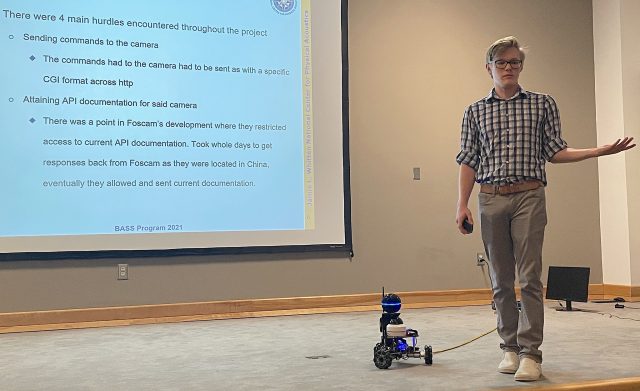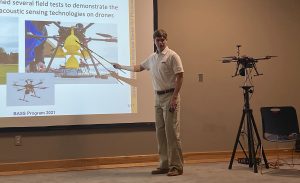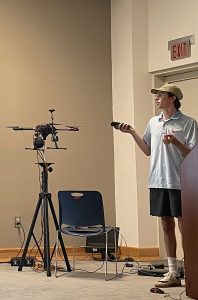
Peyton Posey, a senior computer science major from Pontotoc, explains his unmanned ground vehicle research as part of the Henry E. Bass Basic Acoustics Summer School Program at the UM National Center for Physical Acoustics. Photo by Shea Stewart/UM Office of Research and Sponsored Programs
OXFORD, Miss. – The rover’s “eye” flashed alive with a blue glow as the foot-tall unmanned ground vehicle viewed the auditorium inside the National Center for Physical Acoustics at the University of Mississippi.
The three-wheeled robot sat still, waiting for a sound. Off to the side, UM student Peyton Posey suddenly clapped. The machine rotated its “head,” an orb housing its camera, in the direction of the clap, with a video screen behind it showing its line of sight to audience members. The robot stopped and focused on Posey as it located the source of the sound.
Posey’s rover is a further exploration of using an acoustic-based hostile fire detection system developed for unmanned aerial vehicles and applying it to an unmanned ground vehicle. It’s just one area of research examined at the center, known as NCPA.
The robot also was the culmination of Posey’s eight weeks of investigation this summer at NCPA as part of the Henry E. Bass Basic Acoustics Summer School Program, a student experiential learning program involving undergraduate students working alongside distinguished research scientists and exploring various physical acoustics and engineering topics.
“The program gives students opportunities to do research directed by experts, exploring topics that are not ordinarily encountered in the undergraduate experience,” said Marta Panickar, an NCPA research associate and director of the program, which was created in memory of Bass, a physicist and acoustics researcher who led efforts to create the center and served as its director from 1992 to his death in 2008.
Students apply to the program, which just completed its 12th year, and are chosen by NCPA staff, including the research mentors.
Once selected, the students are assigned a research adviser and topic. Over the course of the summer, the students receive a well-rounded learning experience through their projects, and also by attending organized lectures and responsible research conduct trainings, contributing in discussion groups and participating in workshops on topics such as scientific abstract writing and 3D printing.
Posey, a senior computer science major from Pontotoc, was matched with Wayne Prather, a senior scientist at the NCPA and research associate professor of physics.
“The most exciting part of the program was seeing the rover assembled and moving, with the help of grad students that helped me wire it all together,” said Posey, who hopes to land a job with a noteworthy robotics company such as Boston Dynamics after graduation. “Another noteworthy moment was finishing up my program to turn the camera, and I got to see the camera moving, which was very reassuring.”
Joining Posey in the program were William Vaughan, a junior mechanical engineering major from Ferriday, Louisiana, whose mentor also was Prather, and Grant Poggenpohl, a senior mechanical engineering major from Lincoln, Nebraska, who is minoring in mathematics. Poggenpohl’s mentor was Adam Green, an NCPA research scientist.
The fourth student in this year’s program was Aidan Ramirez, a student at Willamette University in Salem, Oregon, whose mentor was Stephen Perry, an NCPA research and development engineer.
Learning on the Go
During the two-month program, students were exposed to the various areas of the center’s research, either through their research or discussion, but the main purpose of the program was to learn, especially problem-solving and adapting to challenges.

William Vaughan, a junior mechanical engineering major from Ferriday, Louisiana, explains his unmanned aerial vehicle research as part of the Henry E. Bass Basic Acoustics Summer School Program. Photo by Shea Stewart/UM Office of Research and Sponsored Programs
For Vaughan, whose project explored using acoustic arrays on a drone to detect hostile fire indoors, there were challenges, including learning how to code and operating various software with no previous experience, and efficiently and effectively communicating difficulties to others involved in the project.
Eight weeks later, Vaughan – who hopes to continue his research at the center as he completes his Ole Miss education with plans to pursue a career in the aerospace industry – successfully demonstrated his project for the auditorium audience at NCPA.
“Having learned code and software components to complete my project has made me much more familiar with these skills and more confident in my ability with them,” he said. “Also, having to frequently communicate with my adviser and co-workers over matters involving my project helped me to develop responsibility and leadership qualities.
“I achieved quite a few personal and professional goals such as leading and completing a research project, participating alongside real-world research and furthering my education through hands-on experience.”
The program allowed Poggenpohl to see a research project through from conceptualization to completion. His project focused on creating two configurations of a widely tunable, pulsed dye laser that has applications in medicine, research and industry.
“As an engineering student, it’s always cool to be able to see something you design be built and even better, work,” said Poggenpohl, who plans to attend graduate school to continue his interests in engineering and research.
Before beginning his project, Poggenpohl had “absolutely zero knowledge about lasers,” but he was able to build a fully functioning laser within eight weeks – “a very tight deadline.”
“I learned that the best thing to do is to just get started; don’t let the time constraints or the enormity of the project overwhelm you,” he said. “This program helped me become a better researcher immensely.
“This was the first time I have given a research presentation. I also learned what working in a research environment is truly like. I learned how to work and collaborate with high-level scientists on a variety of projects.”
Premium Experience on Relevant Topics
Posey’s project has real-world uses in hostile environments, where soldiers or law enforcement can use an unmanned ground vehicle to warn and protect against incoming gunfire.
Through his research, programming-related questions arose, such as what was the most efficient way to program the unmanned ground vehicle or how to program two devices to communicate with each other.
Sometimes the question was simply: What’s the issue and how to best solve it?
“Those were common denominations between all the issues, and the day-to-day was simply just testing various solutions, observing if they worked and how well they worked, implementation, and then refining everything into a reliable demonstration,” he said.

Grant Poggenpohl, a senior mechanical engineering major from Lincoln, Nebraska, explains his laser research. Photo by Shea Stewart/UM Office of Research and Sponsored Programs
“I believe the program offered premium experience in an environment where you have to find your solutions, then weigh if that is the best way to solve the problem. That real-world experience is priceless and is something more students would benefit greatly from.”
Ramirez’s project, involving researchers from the NCPA’s High Speed Aeroacoustics Group, examined testing hybrid rocket motors for high particle loading scenarios.
Since most of the research performed at the NCPA is externally funded by either the U.S. government or private companies, the students were all embedded in research groups investigating real-life, relevant acoustics topics.
“Through the program, the students can be a part of the future; not just read about the past in the school textbooks,” Panickar said. “The goals of the program, from my point of view, are that the students learn about, experience and enjoy acoustics, and the students learn the steps involved in responsible and effective research.
“Over the years, I think nearly all NCPA full-time research personnel were a mentor at one point or another. We all got into research because we enjoy it, and sharing with students that joy of curiosity and welcoming a scientific challenge is very gratifying.”